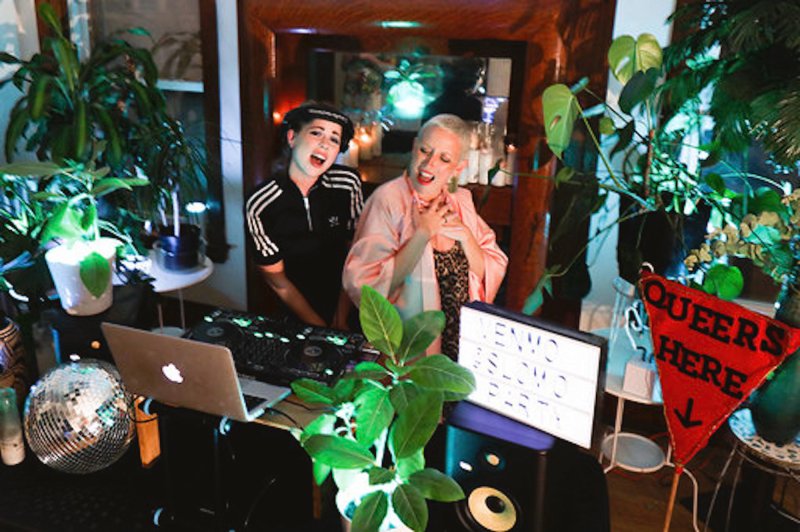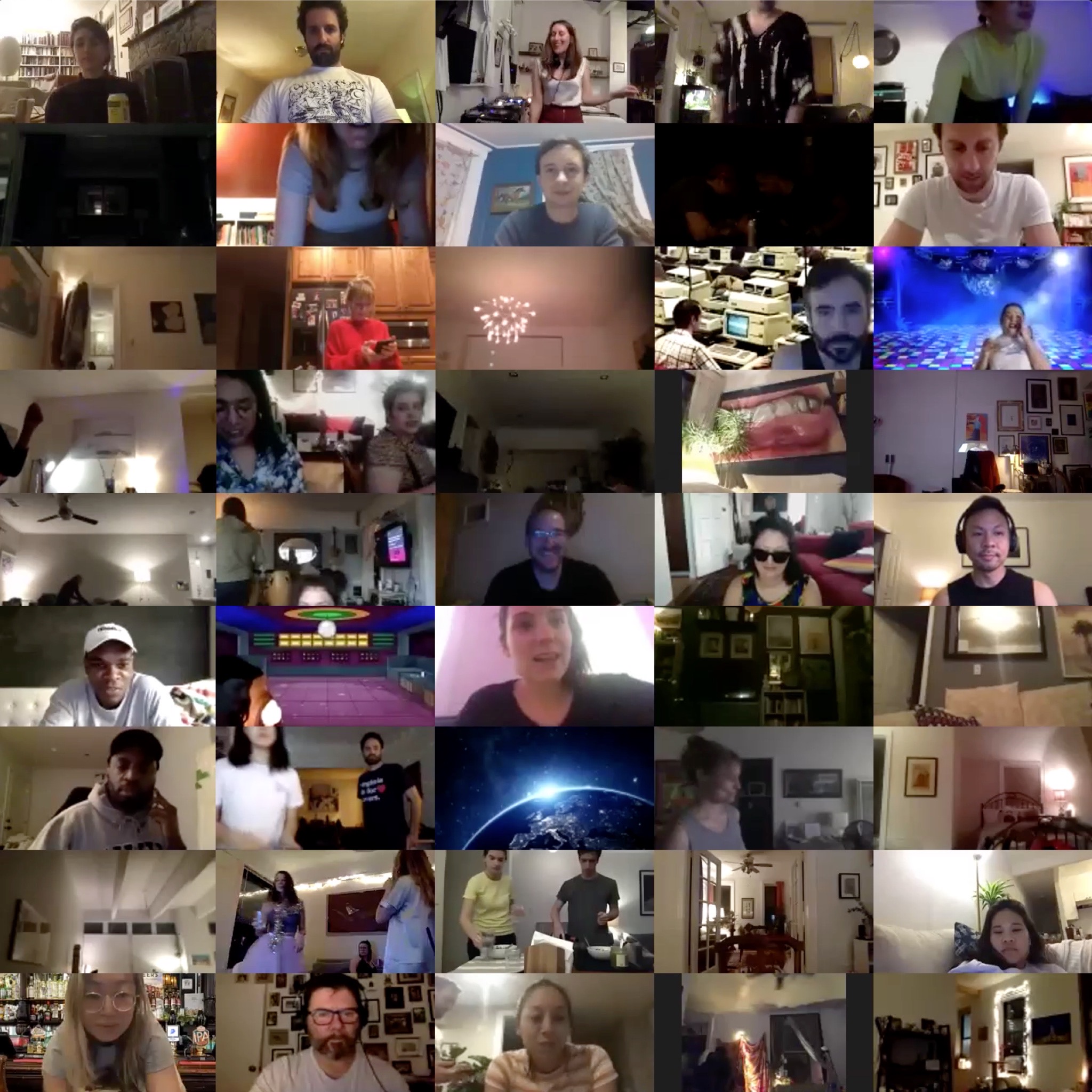
For the past nine years, Slo’ Mo, an LGBTQ+ dance party that plays R&B, soul, hip hop and house, has had a residency on every third Thursday of month, without fail, at The Whistler, a cocktail bar in Chicago’s Logan Square. However, when Illinois ordered last week that all bars and restaurants close to prevent the further spread of Coronavirus, Slo’ Mo co-founder Kristen Kaza wanted to find a way for their community to still find joy during a time of uncertainty. The Slo’ Mo crew decided to continue to keep the event scheduled, but to change it to an online party where people could participate safely from home.
“We’ve never cancelled in nine years and we didn’t want to let people down now, so we really quickly figured out how to have all digital dance party of all ages,” Kaza tells TIME. “Our party’s mission is to provide joy and a sense of community connection, although we’re getting creative now with putting it online, it’s a reminder to people that we can still do this, we can still find ways to get together — we’re just using different tools and environments to do that.”
The party, which streamed live from multiple DJs’ homes, via the Slo’ Mo Instagram and Facebook feeds, garnered 5,000 views in total; for context, the Slo’ Mo party at the Whistler usually has an attendance of about 200 people over the course of a night. Just because the sets were being played from home, didn’t mean that there’s wasn’t atmosphere either. The Slo-Mo artists had dancers leading choreography routines, colored lights, and even a disco ball, in addition to their usual setup of speakers and sound equipment. The party also provided some much-needed support to the artists and those who work at The Whistler; participants could buy sliding scale tickets online on the Slo’ Mo website to the virtual party or send a Venmo to the team, with a suggested donation of $5.
Slo’ Mo’s dilemma is one faced by many artists, venues, and workers in the hospitality and nightlife industries, after public health experts’ recommended orders have shuttered these spaces, which has jeopardized their livelihoods. While the motive of the DJ is usually to get the party going, now making a living is a challenge in and of itself.
Meanwhile, those working in service, hospitality, and nightlife are experiencing mass layoffs. Social distancing for these workers doesn’t mean working remotely, but often being out of work entirely, let alone having access to paid sick leave or health insurance.
As such, the virtual party is an alternative of sorts for both gathering and celebrating in person. Since social distancing has become par for the course, it’s a temporary solution for those whose work has taken a hit during these unexpected circumstances.
Keep up to date with our daily coronavirus newsletter by clicking here.
For Brooklyn, New York City-based DJ disco and house trio Pleasure Jams (consisting of artists Allie Bell, Alex Mallis, and Tomie Marosy), throwing a digital dance party was a way to fundraise for the venues they played at. Inspired by collectives like TFW.NYC and Club Quarantine, they hosted their first digital dance party last week to support C’mon Everybody, a live-music and dance lounge in Brooklyn, New York City.
“Unfortunately, not everyone is going to make it through to the other side and the thing we’re trying to do is just help them make it a little bit longer,” Bell tells TIME. “Maybe just one push of fundraising could help them make it through this for now.”
Mallis said that community space and art is essential, especially during tough times.
“When budgets get tight, arts are often the first thing to go to the cutting block,” he said, noting that they’ll be hosting a party every Friday to support a different venue that they play at. “But these nightclubs are our community spaces, it’s where people go to feel connected to each other, to feel solidarity, to express themselves, and feel safe and accepted. They’re so much more than small businesses, they’re cultural institutions that we need to protect.”

For C’mon Everybody’s co-owners, couple Eric Sosa and Mike Zuco, the digital dance party was a re-affirmation of the close-knit community they’ve built with their bar, which has grown a loyal following for its 70s-themed dance nights and live concerts.
“Everyone gave something, which was really important, since I know it’s a really hard time for everyone financially and we’re all out of work for the most part,” Sosa tells TIME. “I think that the most important thing is to know that no one is alone. Even though it can feel really lonely because everyone is isolated from each other, we are all in this together and we’ll get through it together and we’ll all come out together on the other side.”
Concerns about the business still loom, however, for Sosa and Zuco, as they do for many other small businesses across the country. The couple had plans to open another bar in South Brooklyn at the end of this month. The opening is postponed for now, but both are concerned about whether or not their current business will survive the bar closures in New York. They have a GoFundMe account set up for the time being, but know that there’s plenty of uncertainty for their industry at this time.
“We’re working really hard to stay afloat right now,” Zuco said. ” I think one of the most important things that needs to be addressed is the fact that no one really seems to be talking about a rent furlough or a rent freeze, for residential spaces and commercial spaces. We all know how high the rent taxes are here, the costs of operations. We do our best, but the reality is that for a small business, there’s not a wide breadth of support for us in a time like this.”
Zuco’s concerns were echoed by Zack Pennington, the co-owner of NoraeBar, a karaoke bar that was set to open in Louisville, KY. just as the state announced that bars and restaurants had to close because of coronavirus concerns.
As a result, Pennington and the staff of NoraeBar came up with the idea to host an online karaoke competition fundraiser by livestream on the bar’s Facebook page. Staffers and other local hospitality and nightlife workers perform songs online, while patrons can “vote” for a winner at a dollar a vote. At the end of the competition, whoever raises the most money is crowned the Quarantine King or Queen, while half of the funds raised go to help the bar and the other half to the staff it was raised for. While the fundraiser has received a lot of support online and raised about $1,300 from the local community, Pennington doesn’t feel the fundraising method solves the larger problems small businesses are facing right now, which he feels needs to be addressed with state and federal aid or even a basic universal income.
“I think that this slows the losses or the hit that we’re all taking, but it doesn’t make up for it,” he tells TIME. “I don’t know if this is sustainable or a full replacement for business as usual. We’re really just trying to figure out what we can do as co-workers, as owners, as team members, what we can do to take care of each other.”
For now though, for Pennington and the others, the party must go on — at least until people can gather in venues again.
“No matter how creative we are or how hard we work, it may not be financially feasible to weather a storm like this,” he said. I do think that nightlife will rebound and be better than ever when it comes back, but the question becomes what bars, venues and restaurants survive long enough to see that. For those of us who can support small business owners and their employees, we should do it.”
Please send any tips, leads, and stories to virus@time.com.
More Must-Reads From TIME
- The 100 Most Influential People of 2024
- Coco Gauff Is Playing for Herself Now
- Scenes From Pro-Palestinian Encampments Across U.S. Universities
- 6 Compliments That Land Every Time
- If You're Dating Right Now , You're Brave: Column
- The AI That Could Heal a Divided Internet
- Fallout Is a Brilliant Model for the Future of Video Game Adaptations
- Want Weekly Recs on What to Watch, Read, and More? Sign Up for Worth Your Time
Write to Cady Lang at cady.lang@timemagazine.com